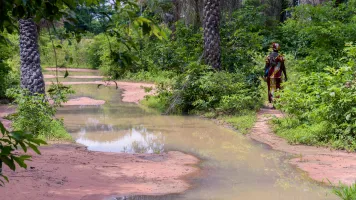In Somalia, rising temperatures and erratic rainfall patterns caused by climate change continues to be a major challenge to the government and its people as they face cycles of worsening drought, food insecurity, deforestation, and more. To effectively combat these issues, timely and disaggregated environmental and agricultural data is necessary. However, data gaps, inadequate data infrastructure, lack of capacity, and other obstacles have prevented the Government of Somalia from timely assessments of the situation, understanding progress, and charting a path toward achieving the relevant Sustainable Development Goals (SDGs).
Investment in Earth observation (EO) data capacity, monitoring of environmental SDG indicators, and more, is crucial to ensure that policy- and decision-making processes are not only informed by evidence, but also lead to sustainable, long-term solutions.
In collaboration with the Islamic Development Bank Institute and Digital Earth Africa (DE Africa), the Global Partnership set out to identify and address key opportunities for strengthening the Government of Somalia’s capacity to produce and analyze timely EO data on environmental and climate issues.
